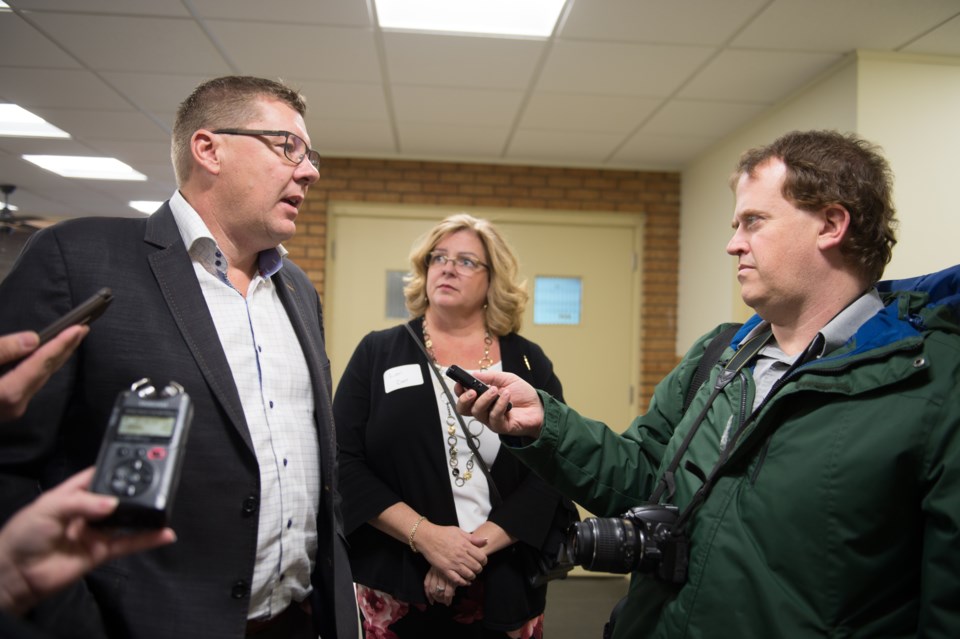Estevan – If sky-high heavy oil price differentials remain, it could cost the province of Saskatchewan $500 million a year.
That’s according to Premier Scott Moe, speaking to reporters in Estevan after a Saskatchewan Party regional meeting on Oct. 13.
The day before, Daily Oil Bulletin shows West Texas Intermediate selling for US$70.97, with a differential of US$50.50 for an implied value of $20.27 for Western Canadian Select (WC). Those numbers indicated a 71.1 per cent discount of WCS compared to WTI.
Asked about this, he said, “Can you imagine the conversation in our nation if this was on agriculture or on the auto manufacturing industry or on an industry such as Bombardier operates in – as 70 per cent discount on the end product that they’re producing? Can you imagine the conversation that would be taking place in our nation of Canada?
“Because it’s the energy sector, for some reason, it doesn’t seem to be resonating at the federal levels to the degree it should be,” Moe said.
“The fact of the matter is we have a disastrous oil differential that's costing the economy and the province of Saskatchewan. The latest figure is $7.4 billion a year. It's costing directly the Government of Saskatchewan about $500 million a year. If you put that in the perspective of the budget that we're trying to balance here in the province, it much more than offsets the immediate financial challenges that we have.”
“This is a challenge, not only for the community of Estevan, and Weyburn, and Lloydminster and Maidstone and down in the southwest, where I was yesterday, in the areas of Shaunavon. This is a challenge, not only for the province of Saskatchewan, in the loss to our economy, and the loss to our government revenues. It’s a loss to all Canadians, when we’re losing this much revenue, simply because we’re not able to achieve the price that other people around the world are able to achieve. We’re not able to achieve the price that Eastern Canadians are paying for their energy products. This is a tremendous challenge. I can’t imagine the outcry that would happen if it was in certain other industries across the nation. It’s something we’ll be bringing to every federal and provincial table we attend,” Moe said.
“The indirect challenge we have with this whole differential is being created and exasperated by the lack of pipeline capacity that we have in Western Canada. We need the pipeline that we one, the TMX (Trans Mountain Expansion), that construction to start, and I’ve called for that numerous times.
Energy East needed
Moe went on, “We need to re-engage on Energy East. We need to engage on every opportunity that we have to get our product to additional markets all around the world. This is something we have advocated on in the past and we need to continue into the future, because the indirect challenge that we have is much of this product does end up on our rails. And we need that added capacity if we’re going to continue to increase our agricultural production, our potash production, as well as our lumber production.
“That’s an annualized number over the course of the year, $500 million in royalties and taxes directly to the government of Saskatchewan, which I think speaks to the enormity of the challenge.”
“The TMX pipeline or the Energy East pipeline does not correct that itself 100 per cent, but it starts to narrow that differential that has gotten so wide as we’ve some production come on in Western Canada.”
Sustainability
“We must not forget this: our production in Western Canada is among the most sustainable in the world. And if you truly care about sustainability and our environment, and the whole conversation about global climate change, it would do you well to consider buying additional product from Western Canada, specifically, I would say, from Saskatchewan, because of the way we actually produce that product and the way we are able to get that product to market.
“Saskatchewan most certainly can be part of not only producing a competitively priced product, a quality product, but a very, very sustainable product. This is message that we brought when we visited China most recently, the U.S. three times, and we’ll be bringing to India shortly. Saskatchewan has a great story to tell, not only from the product we generate here, whether its energy, agriculture and potash, but also from a sustainability perspective and a global climate change perspective,” he said.
Asked what the impact will be on upcoming budget discussions, he said, “You’re going to see a balanced budget in the province of Saskatchewan this next spring. That’s been our commitment. It was a three-year plan to balance, and we remain on track to achieve that plan to balance. If we were able to close the oil differential, and, I think, if we were able to approve all the pipelines that we have, I don’t know if that would close the oil differential by the time we deliver our budget next spring. But it would greatly enhance the finances of the Saskatchewan government and the Saskatchewan economy for years into the future. So we will release a balanced budget next spring.”




